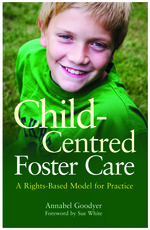 Dr Annabel Goodyer is Principal Lecturer for Social Work at London South Bank University, UK. She is a qualified social worker and has many years’ experience working with children and families.
Dr Annabel Goodyer is Principal Lecturer for Social Work at London South Bank University, UK. She is a qualified social worker and has many years’ experience working with children and families.
Here, Dr Goodyer shares the vision of a children’s rights-based model of foster care mapped out in her new book, Child-Centred Foster Care: A Rights-Based Model for Practice.
What does “child-centred foster care” mean, and how does it differ from conventional ways of thinking about foster care?
Foster homes are provided as a public service, but have traditionally been understood from a psychological perspective. I advocate that we should understand fostering as a service that should provide children with a stable, private family life. The absence of a rights-based approach means that children and young people have little security in foster care, for example they can be moved without any prior notice. A rights-based approach means that looked after children and young people are involved in decision-making about their lives and can work towards a socially-included adulthood. This might involve offering children service level agreements, such as: Unless it is an emergency, we will not ask you to move schools whilst you are studying for GCSE’s.
How did your experiences as a Children’s Guardian and child and family social worker influence the rights-based approach you take in this book?
Many of the children and young people I worked with were quite capable people, who stoically dealt with the vagaries of the care system. I didn’t see the life stories I had witnessed represented in the literature about fostering. This motivated me to research children’s experiences from their own accounts.
Some of the Foster Carers I met were steady, generous caring people, who really made a difference to vulnerable children. I remember asking one foster mother whether her two new foster children were in emergency or short-term placements. She told me that she didn’t believe all that rubbish; she looked after children until they didn’t need her anymore, and only had a vacancy because one of her previous foster daughters had left home last month when she married at age 23. These two new foster children had been badly abused and were quite fragile. From being shunned, unkempt withdrawn pupils at school, they slowly gained confidence and learnt how to play and to relate to others. Unfortunately not all foster carers offer the calm, firm stable parenting that can enable children to develop in this way.
The book provides a useful summary of existing research on children’s experiences of foster care, and combines this with original chapters describing children’s experiences of moving to foster homes, their foster carers and the services they received. Did these accounts reveal any findings which surprised or shocked you?
Sadly, these accounts are all to familiar to me and to most experienced practitioners in child and family social work.
The book also provides a practice model for rights-based work with children. Can you give some examples of what this approach looks like in everyday practice?
It means understanding the wishes and feelings of the looked after children you have responsibility for and supporting them towards maturity and independence at their own pace. It does not involve making unilateral, financially-led decisions such as: All looked after children can move out of foster homes into independent living (hostels) at age 16.
In your experience, are children’s rights now being taken as seriously as they should be by policymakers and frontline practitioners?
I don’t think the problem is that they are not taken seriously, it is that they are not priroitised which in many cases has led to grave consequences. Currently, care-leavers are amonst the most disadvantaged young people in the UK, for example most female sex-workers have formerly been in care.
Finally, how do you see foster care developing in years to come?
Well, I would like to think that fostering will become less regulated, less “professional” and more like normal parenting. We need to select foster carers who can be “Good Enough” stable parents to children and young people who can sometimes be difficult and demanding. “Good Enough” parenting means considering Foster Carers who might be currently screened out, because for example they are overweight or smokers or might have to put children in a shared bedroom, but who are competent at looking after children. We need to trust them to get on with the task and offer support, back-up and additional services when and if they are needed.
Copyright © Jessica Kingsley Publishers 2011.